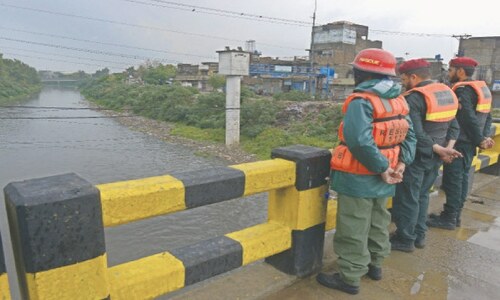ISLAMABAD, Oct 15: The recent acquittal of a man charged with attacking the convoy of former president Pervez Musharraf has once again highlighted the weaknesses and loopholes in the criminal justice system.
An anti-terrorism court (ATC) in Rawalpindi on September 18 acquitted Rana Mohammad Faqir, who was accused of attacking Gen Musharraf on December 25, 2003.
According to the FIR of the incident, “It was 01:40pm when the cavalcade (of Gen Musharraf) crossed Jhanda Chowk, then suddenly two carry vans burst from the petrol pumps towards the cavalcade to launch an attack on the president.”
According to the prosecution, Faqir was accused of planning the attack and having been positioned in front of Jinnah Park of Rawalpindi, but the investigators said his explosive-laden vehicle failed to start when the presidential convoy passed through the park.
Faqir was arrested in 2007. The FIR of the Musharraf attack case was registered by the Civil Lines police in December 2003.
Apart from the trial of civilians Rana Mohammad Faqir, his daughter-in-law Shazia Mubashir and Jamshed Raza in the ATC in this case, a separate trial of 12 people, mostly serving soldiers, was conducted by the Field General Court Martial in 2004 for another attack on the convoy of Gen Musharraf on December 13, 2003. In the latter trial, all the accused persons were convicted.
The 12 convicts included Rana Mohammad Naveed, the son of Faqir; Adnan Rashid, the mastermind of the Dera Ismail Khan jailbreak and a former PAF junior technician, PAF chief technician Nawazish Ali, chief tech Khalid Mehmood, Naik Arshad, Niaz Mehmood, Zubair Ahmed, Rashid Qureshi, Ikhlas Ahmed, Rana Naveed and civilians Mushtaq Ahmed, Ghulam Sarwar Bhatti and Amir Sohail.
Since Rana Naveed, the son of Faqir, was also involved in the earlier attack, the military authorities allegedly picked Faqir along with his 14 family members and later implicated them in the FIR of December 25 attack.
The weak case against Faqir
The prosecution in the challan against Faqir submitted to the ATC listed 150 prosecution witnesses. However, it was the reflection on the prosecution and judicial system that by the time of the acquittal only 61 witnesses had recorded their testimony.
According to the detailed order passed by the ATC Judge Chaudhry Habibur Rehman, out of the scores of witnesses who testified, only three police officials – Pervaiz Iqbal, Mohammad Mumtaz Hussain and Tahir Naseem - were relevant. Only these three testified that they had seen the vehicle in which Rana Faqir was sitting.
This, however, was not the only weakness in the prosecution case. The court order pointed out that the vehicle allegedly used by Faqir was never found and taken into custody, calling it “a very important link missing in this case”.
The order added: “No plausible explanation has come forth as to why the said Suzuki pickup was not taken into possession by the investigating officer and neither any recovery memo was prepared if it was actually present at the… bridge with the intention to cause a third bomb blast.”
It noted: “When the Suzuki pickup in which Rana Faqir was allegedly sitting on the fateful day has not been made part of the case property, then his very presence at the… bridge becomes doubtful.”
The prosecution’s case was also problematic about how and when the accused had been picked up.
The defence counsel told Dawn that Faqir was “a missing person” from December 2003 to 2007. He claimed that intelligence agencies handed over his custody to the police in 2007 after which the police falsely implicated Faqir in the case.
Agencies’ poor planning
According to him, one of the reasons behind the acquittals in terrorism cases is the poor planning on part of intelligence agencies.
“After picking an individual, they try to link him to a particular high-profile incident but the prosecution fails to connect the accused with the crime during the trial,” he argued.
It may be noted that in August 2011, the then chief justice of Islamabad High Court (IHC) while setting aside the detention of some alleged terrorists highlighted these flaws: “The court must be satisfied that the material before the detaining authority was such that a reasonable person would be satisfied as to the necessity for making the orders.”
The order added: “The detaining authority must place the whole material, upon which the order of detention is based, before the court notwithstanding its claim of privilege.”
The threats
However, this is not to say that the weak prosecution case is the only problem.
The threats faced by the witnesses, prosecutors and judges also play a role in the acquittal of the accused persons.
A serving judge told Dawn on the condition of anonymity that terrorists first threatened judges through text messages.
This is followed by harassing and threatening phone calls in which the judges are warned against passing adverse orders or judgments against the accused.
The third step is delivering threatening letters at the residences of the judges.
“The government and security departments also forward the judges security alerts regarding the threats from terrorists,” he said. The judge admitted that the pressure did have effect.
“These threats work sometimes and a judge either clears the accused or drags out the trial till the time of his posting to some other city,” he added.
It has been also learnt that during the jail trial of a high-profile terrorism case in 2010, the newly-appointed chief prosecutor received a threatening text message on his personal mobile number soon after he entered the Adiala Jail.
He, however, attended the proceedings and discussed the issue with the ATC judge.
The judge told the prosecutor that he received threatening text messages, calls and letters every day.
The prosecutor quoted the judge as having told him: “When I get a call, I simply point out that I had never convicted any terrorist.”
The judge had acquitted terrorists allegedly involved in five high-profile terrorism cases. These cases were related to attacks on installations including a couple of high-profile attacks in Islamabad in which civilians and military personnel were killed.
Justice (retired) Wajihuddin Ahmed is of the view that in order to protect the lives of judges and the prosecutors, their identities should be kept secret.
“Although our criminal justice system does not allow for this, we can amend the relevant laws,” he said.
Citing the example of South American courts where even the voices of the judges and prosecutors are altered before being made public in the courtrooms, Mr Ahmed said Pakistan too could adopt similar precautions.
He, however, stressed that the legislation should not be in contravention to the basic fundamental rights.














































